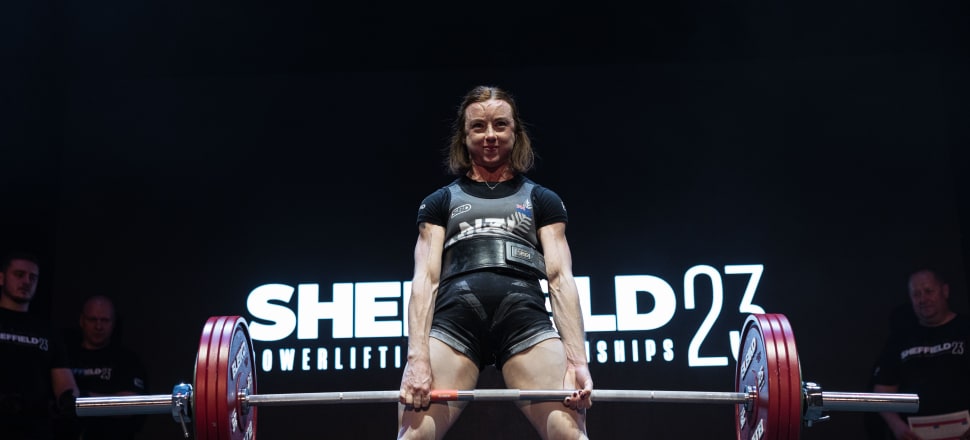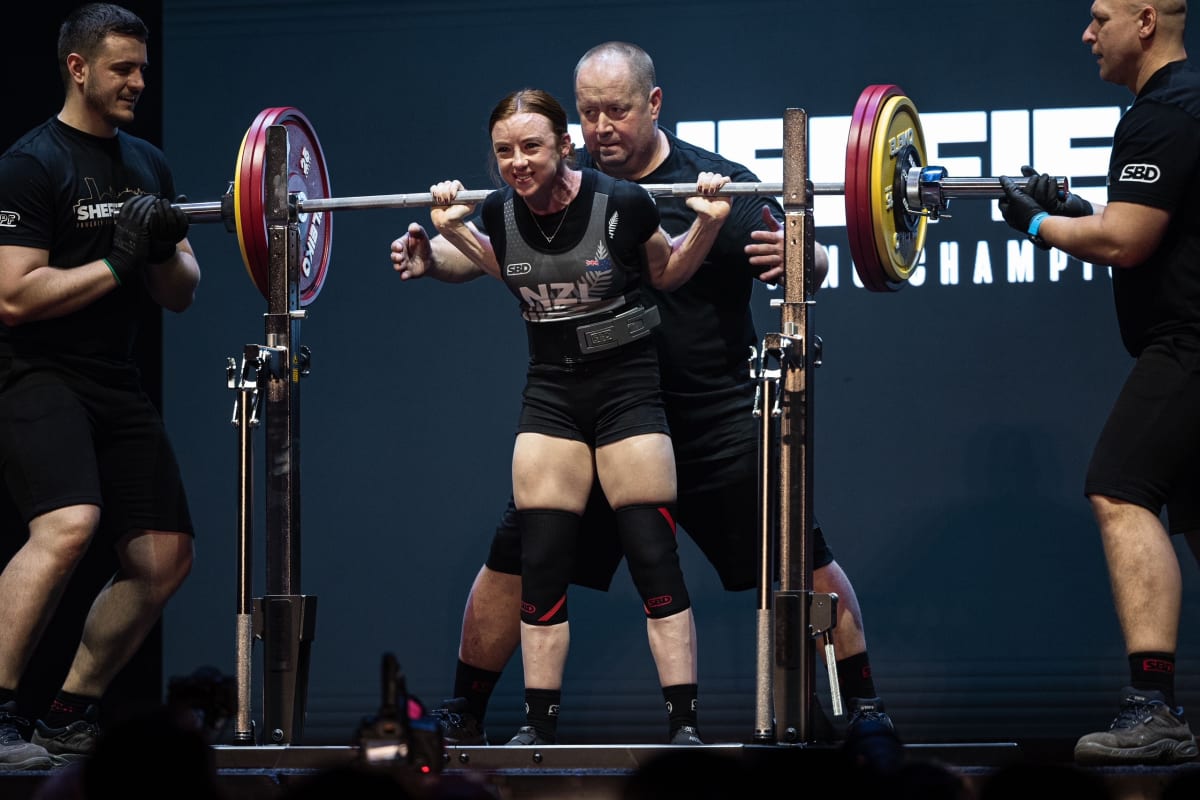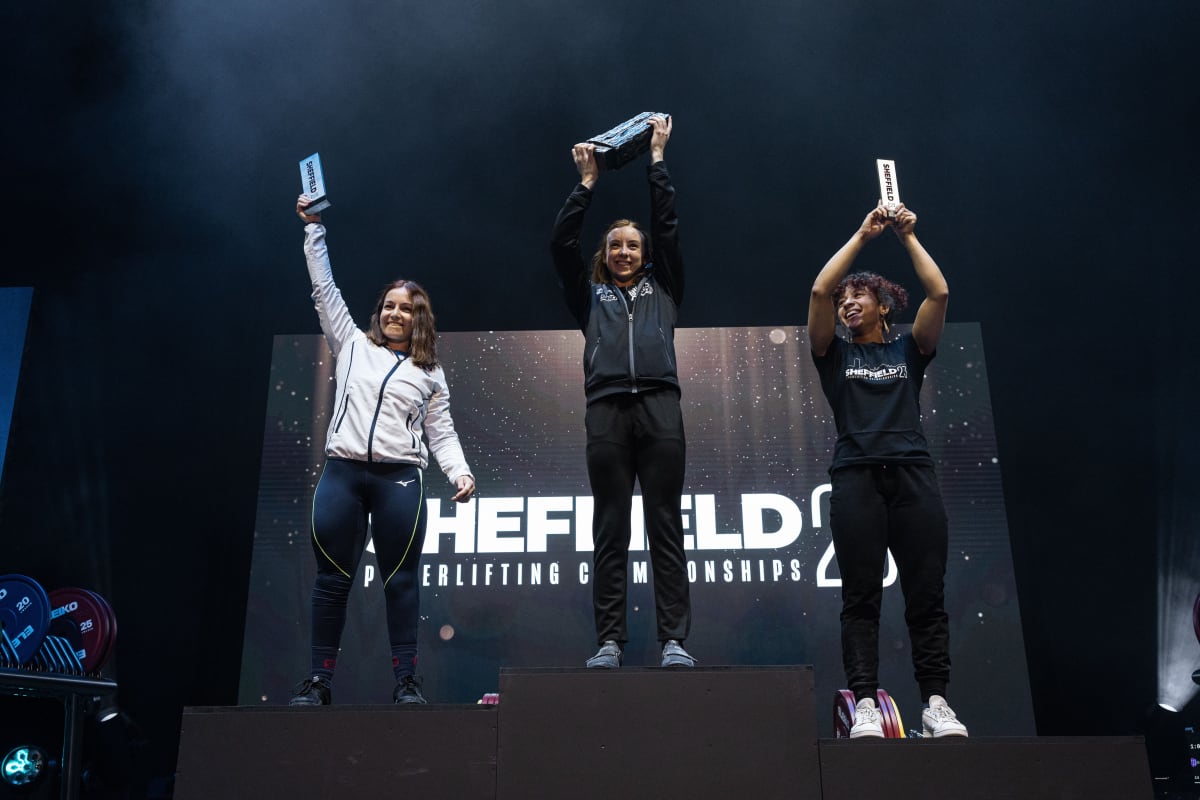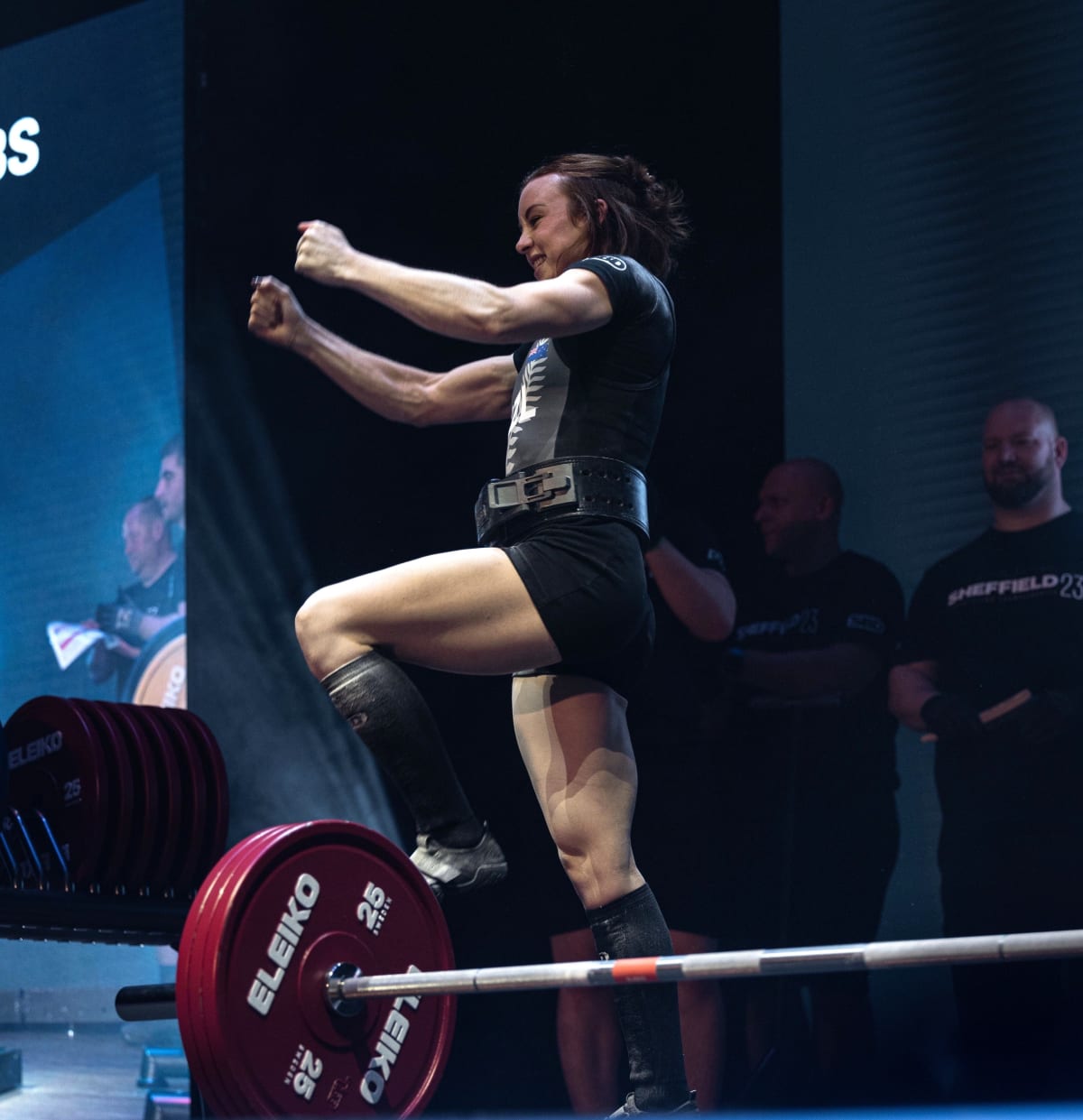
Evie Corrigan may be small, but she's a giant in world powerlifting - beating all-comers in a unique event in Sheffield. And she's inspiring teen mums as she goes, Aiden McLaughlin writes.
In a city famous for its steel, New Zealand’s own iron maiden has just raised the bar in the world of powerlifting.
Evie Corrigan returned to England, the country of her birth, last month to compete in the Sheffield powerlifting championships, an invitational event which brought together 12 women and 12 men lifters from around the world.
Corrigan, 27, who’s lived in Aotearoa since she was seven, was invited to the prestigious first-of-its-kind competition along with Kiwi compatriot, Waiuku doctor Karlina Tongotea.
But it was Corrigan who won the overall championship title - across all 24 competitors.
She squatted 160kg, benched 97.5kg, and deadlifted 202.5kg in the under 52kg weight class, to better the previous weight class world record by 105.023 percent - the highest percentage achieved at the competition.
It was a competition Corrigan, who works with teen mums at James Cook High School, had been waiting to compete in for three years - repeatedly delayed by the pandemic.

Before going to Sheffield, Corrigan was competing in the under 57kg class, but dropped down a weight class to 52kg - a deliberate strategy to attempt to make the competition rules work in her favour.
But by her own admission, cutting that much weight was risky. Also, how would 40 hours of travel affect things? Corrigan says most people were expecting her to come last.
“It was an opportunity to seek out where the weaker records were, the ones that hadn’t been pushed up as much in recent years,” Corrigan says.
“Women’s powerlifting has really grown a lot and some of those records had been broken multiple times in the last year. The 52kg record was perhaps weaker than the one at 57kg so my coach [Jason Clarke] said ‘That’s the one’.
“We adopted a strategy to compete in that and I think that’s what threw everyone off. But my coach says this is the last time I’ll ever be able to fly under the radar.”
Working in the gym on constant repetition has made Evie Corrigan stronger
Corrigan is the second eldest of five siblings. Her mum, Claire (also a competitive powerlifter), and dad, Kenny, settled the family in Christchurch 20 years ago. It was actually Corrigan’s older sister, Ciara - the founder and owner of Unbreakable Training in St Albans - who got into powerlifting before her.
“She was coaching powerlifting and she took me along to help out at one of the competitions [seven years ago],” Corrigan says. “I saw another small female doing a really heavy deadlift and I thought ‘Wow, that’s really cool; she’s so strong even though she’s small like me’.
“So my sister told me I should give it a go and she started coaching me after that.”
Within a few months, Corrigan entered her first competition, but things started to take off when she moved to Auckland in 2017. From there, under a new coach, Corrigan won gold in the junior women’s event at the 2018 world classic powerlifting championships in Calgary, Canada, setting two junior world records in the squat.
“I was so excited and so nervous, I couldn’t eat anything,” Corrigan remembers. “I think I went in nominated sixth, so I was just going for the experience, just to have fun. So I got quite a shock when I ended up winning.”
Away from powerlifting, Corrigan works for the Taonga Education Centre, in a teen parent unit attached to James Cook High School in Manurewa. She help the students and their babies with anything health-related, including health education, booking appointments and immunisations. Taonga actively promotes a wide range of learning experiences for the students and provides ongoing opportunities for them to acquire independence and leadership skills.
It’s not where Corrigan imagined she would end up working. “I studied anthropology and then I did a post-grad in international development and I was sort of looking to work overseas. But I finished right as Covid hit, so I found something locally and this really interested me.
“It’s a very small school with close relationships that you build between the staff and the students.”

With powerlifting almost entirely self-funded, her income is crucial to cover her travel and training. Fortunately for Corrigan, her employer has be supportive and accommodating, allowing her to take special leave to compete in Sheffield.
The students also take a lot of interest and pride in Corrigan’s lifting achievements.
“They’re all young women and perhaps they’ve not always come from a background where they have a lot of power or agency,” she says. “So I think it helps them to see that you can do things that you set your mind to; women can be powerful and achieve these things if you’re willing to work at it.”
Like so many others, Covid-19 had an impact on Corrigan’s ability to compete, especially overseas, but time in New Zealand allowed her to develop her craft - not only physically, but mentally.
Although she doesn’t have a mental skills coach, Corrigan has worked hard on that aspect of her performance and isn’t ruling out working with one in the future.
“I think it’s been quite stop-start [since Covid]. I’ve grown a lot as a competitor in terms of my strength, but I think I’ve grown even more in terms of the mental games and the mindset that I have,” she says. “That’s been a real gamechanger for me. It’s unlocked another level of performance.
“I’ve had to move from trying to get certain outcomes and putting a lot of pressure on myself, to focusing on things I can control, enjoying the process and just doing the best I can in each element of that process.”

The next major competition for Corrigan is the world championships in Malta in June. She’s also automatically invited for the 2024 instalment of the Sheffield event to try to defend her title. Long-term, she’s open-minded about just how long her competitive career can run.
“I think it’s quite unique in that you can continue to get better. The progress slows, but after you reach 40, you become [eligible for] masters and then there’s age categories every 10 years, so you can continue to compete for as long as you like,” she says.
Corrigan is happy with the growth of the sport in this country, but she’d love to see even more people try it. The doors are open, she says, for anyone to give powerlifting a go.
“I think it’s definitely growing here,” she says. “In addition to competing, I’m also part of a local association in Auckland and our national association and a whole heap of younger kids are coming through in powerlifting.
“We would love to have more people. It’s truly a sport for everyone”.







